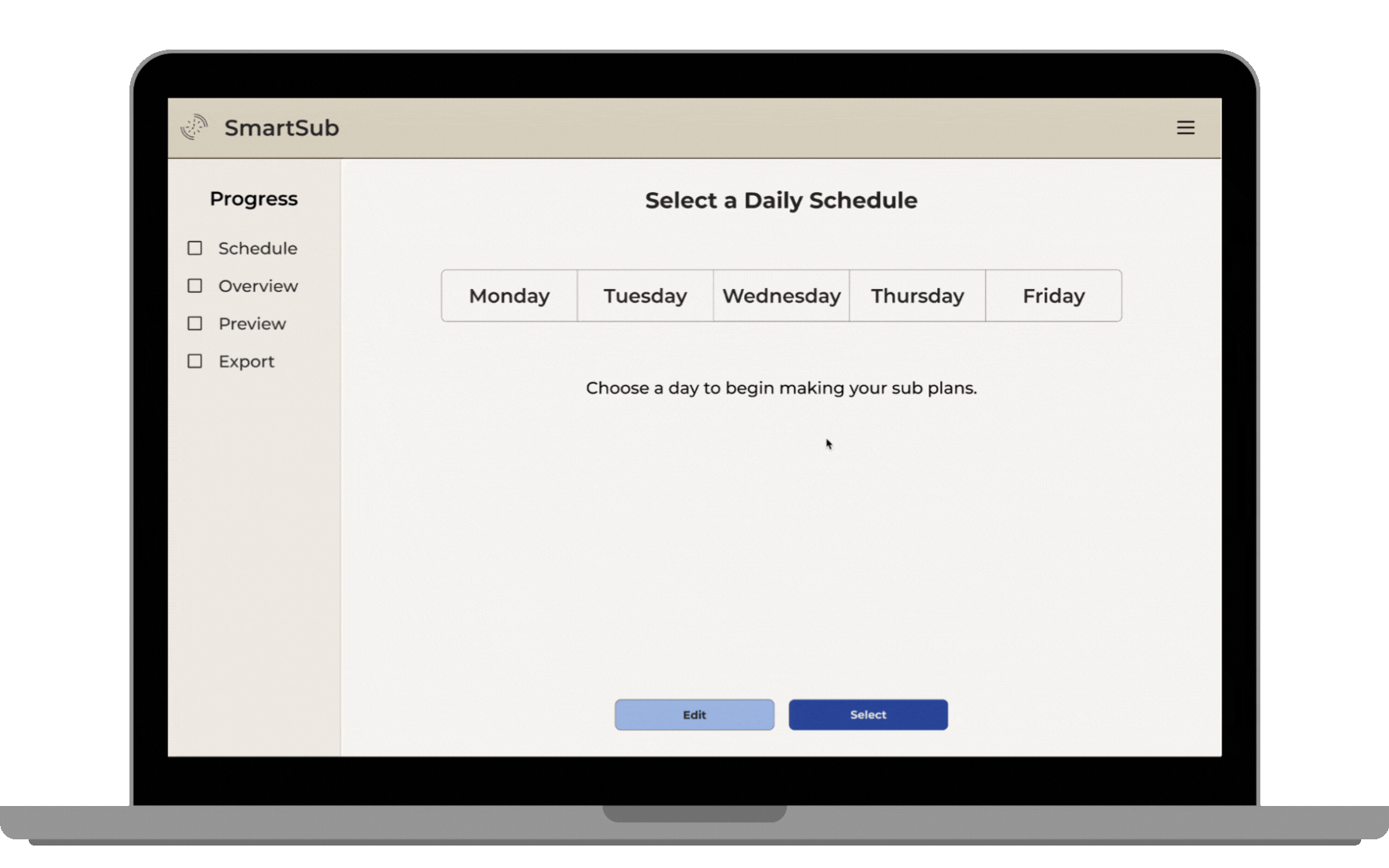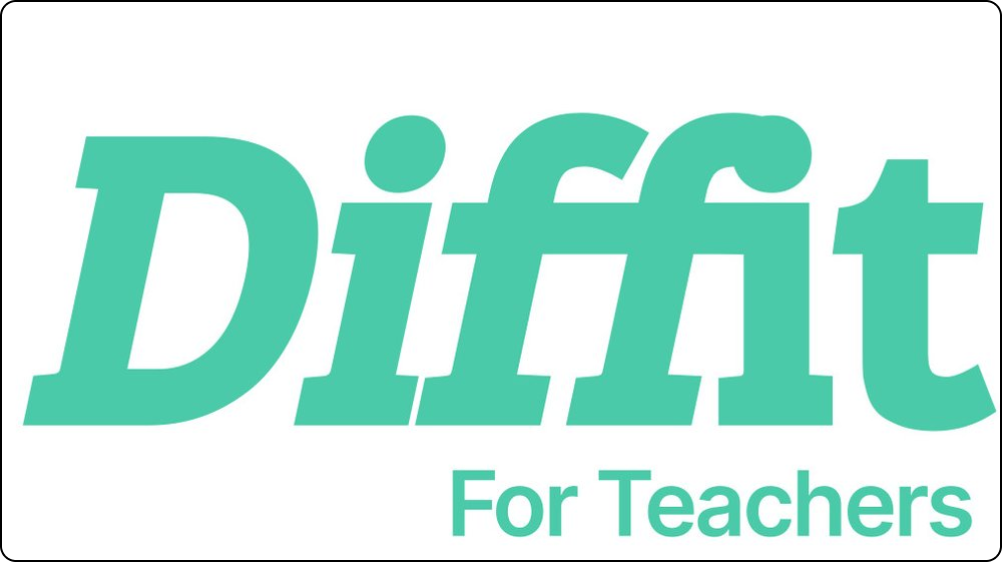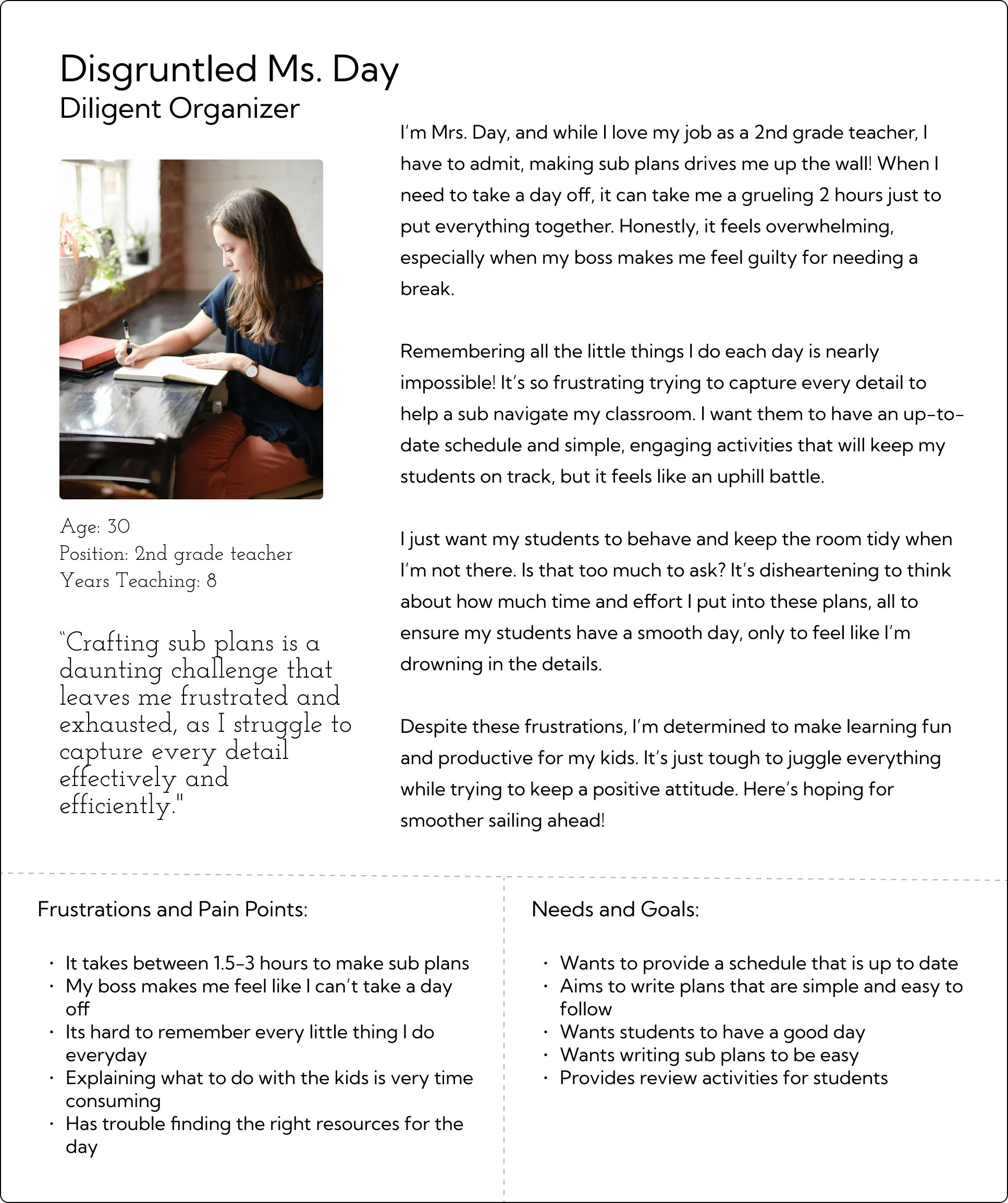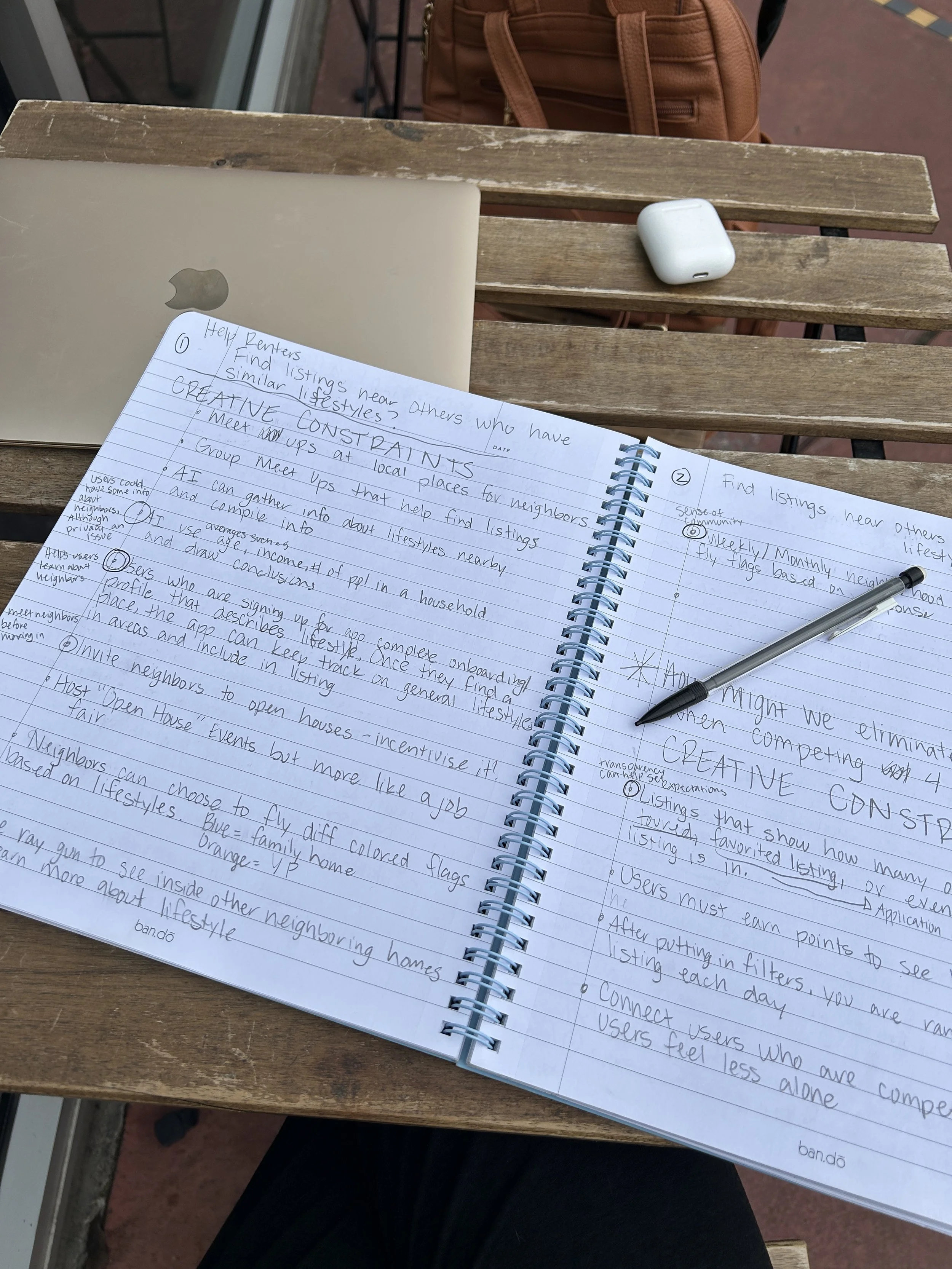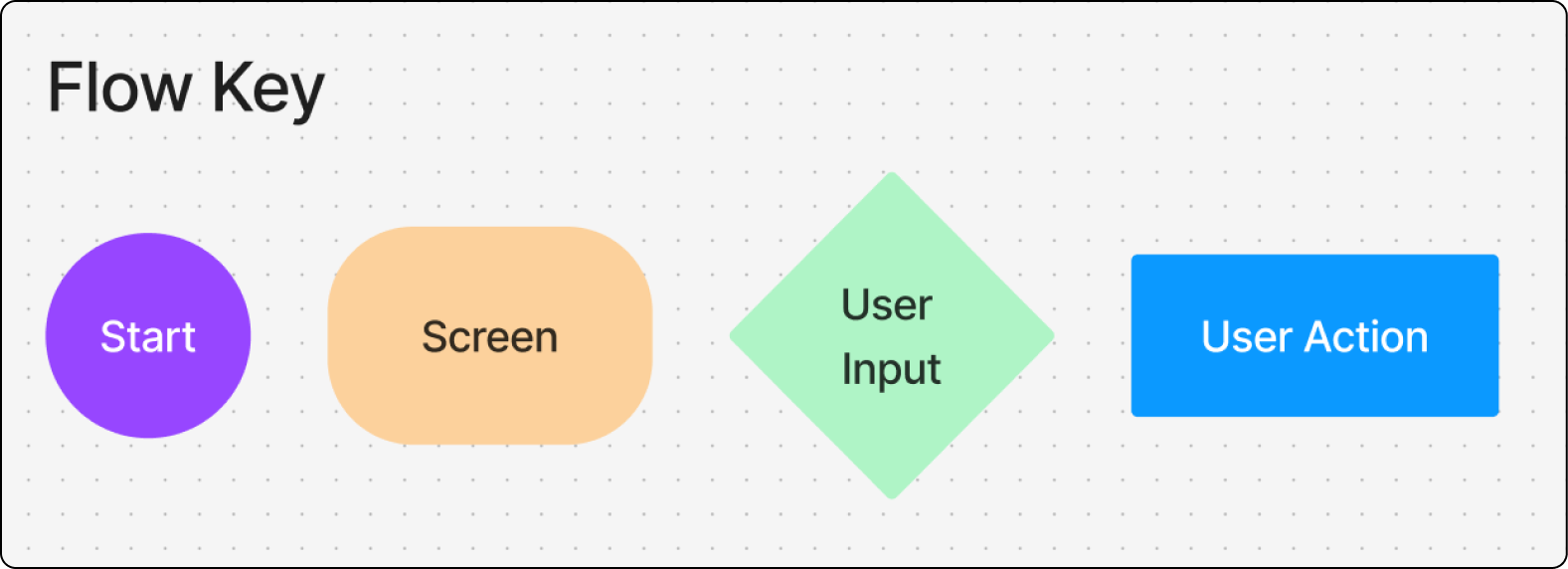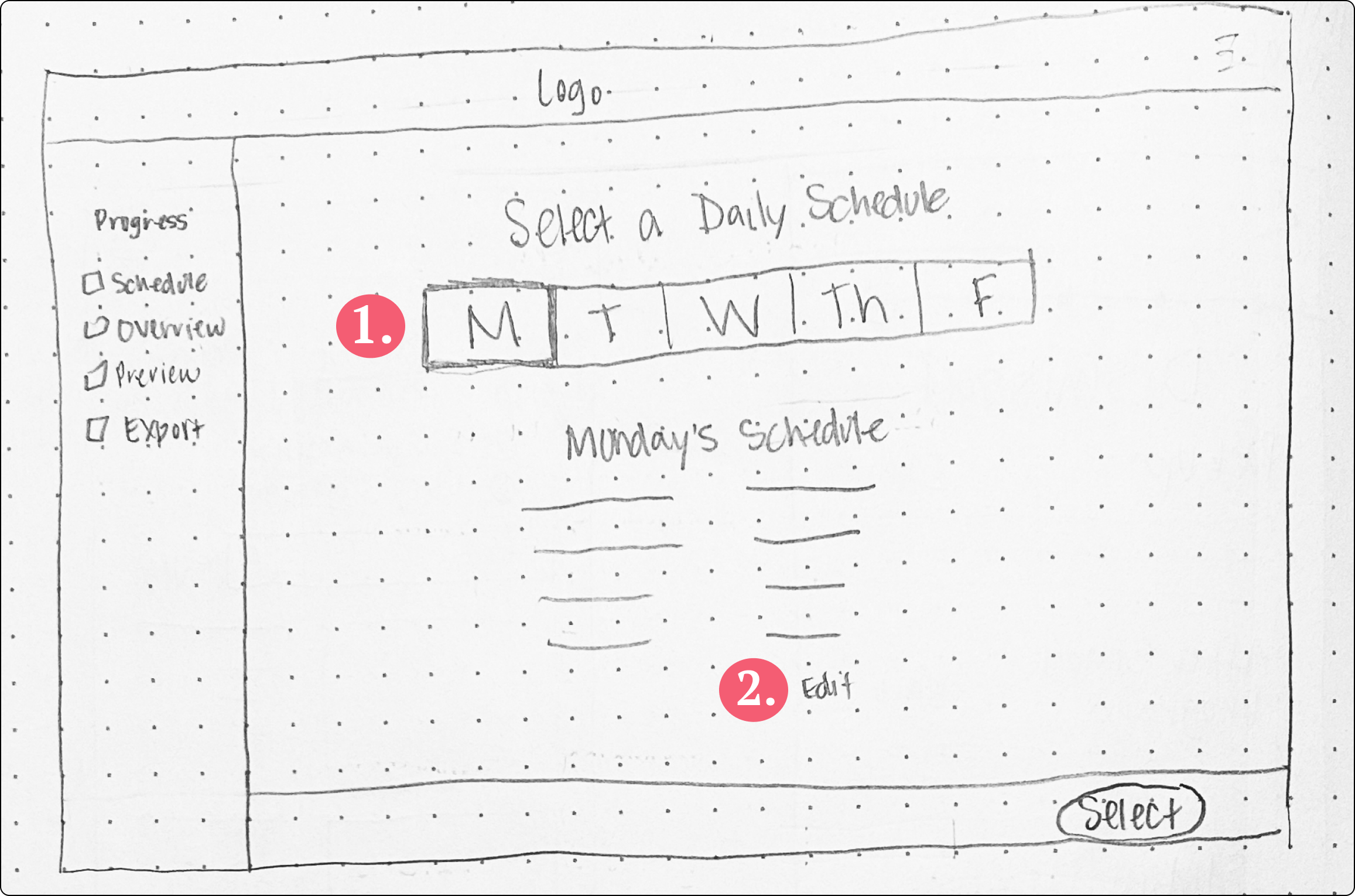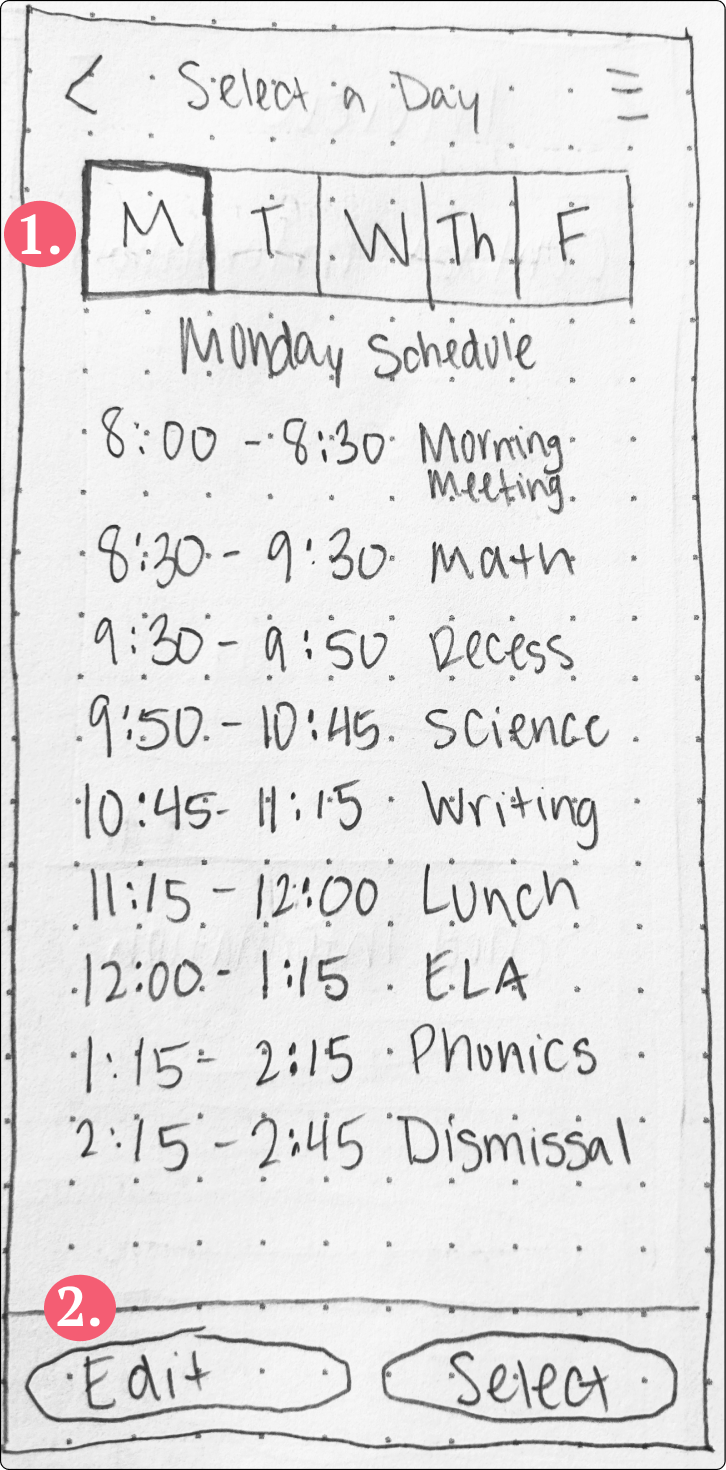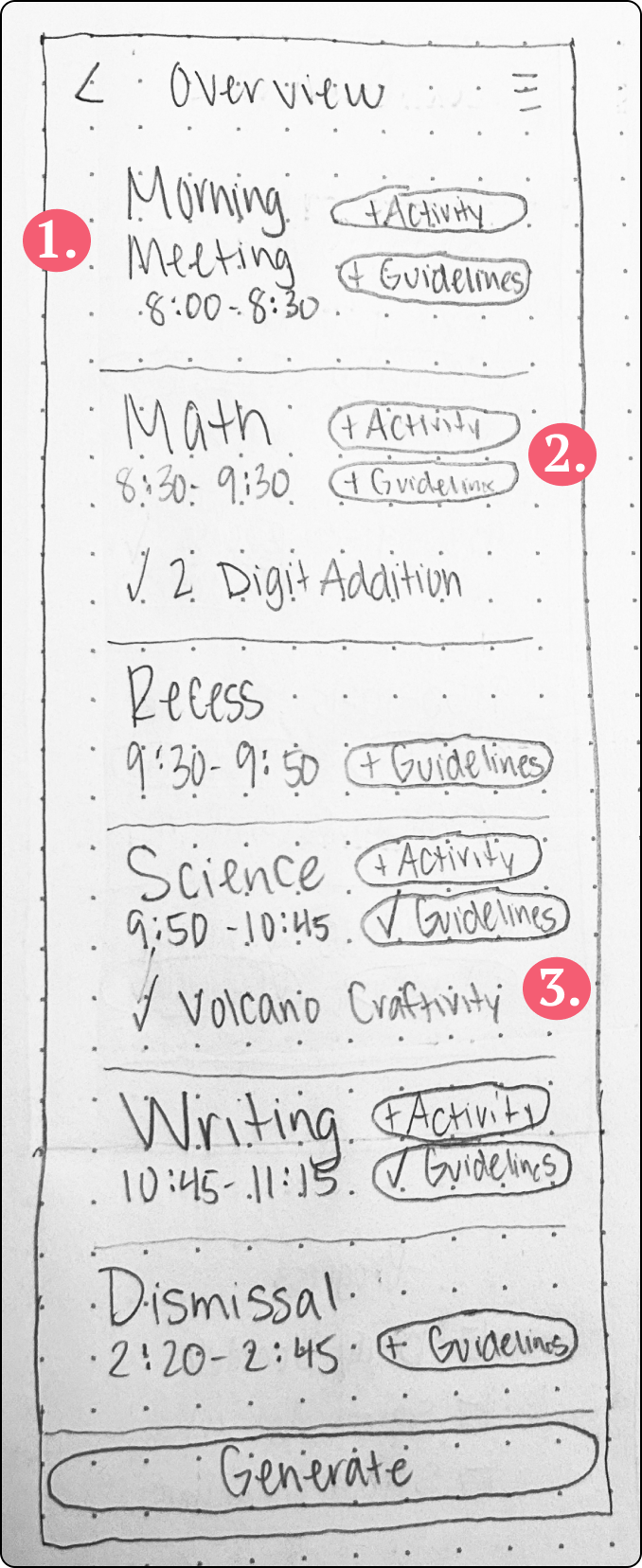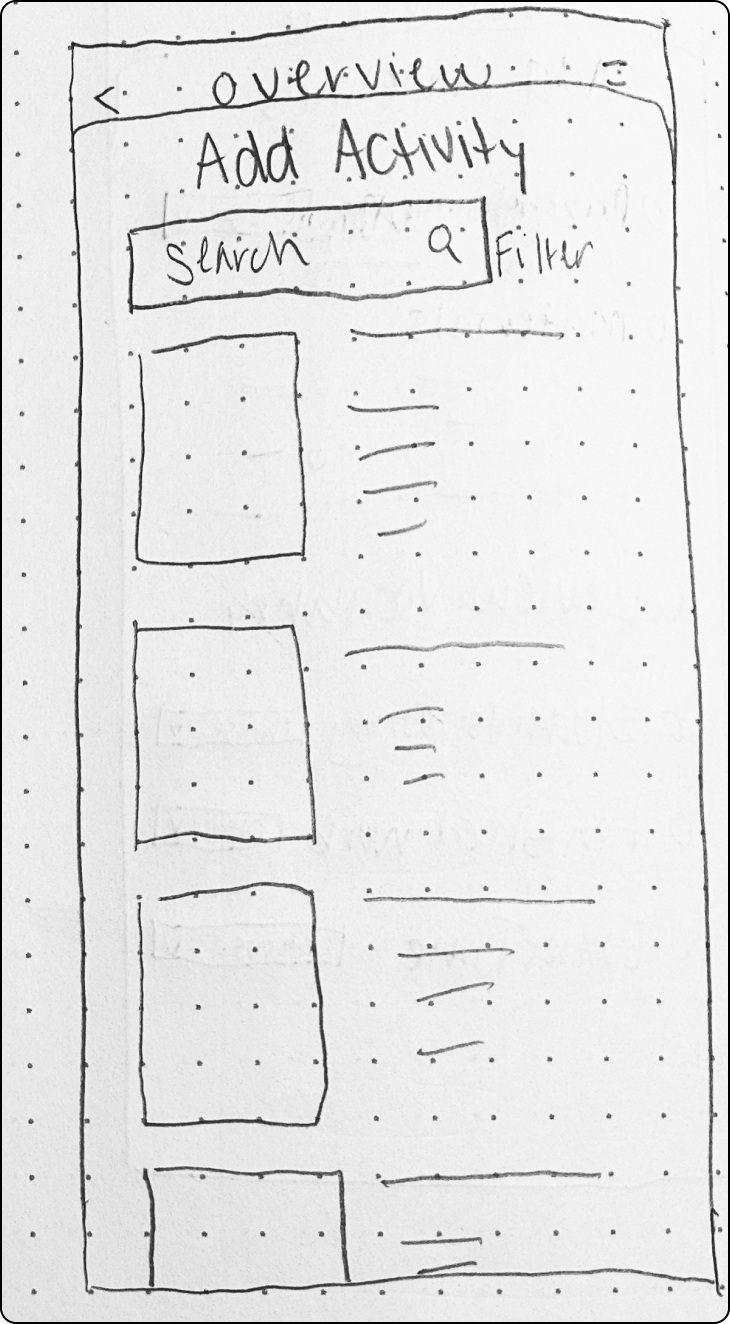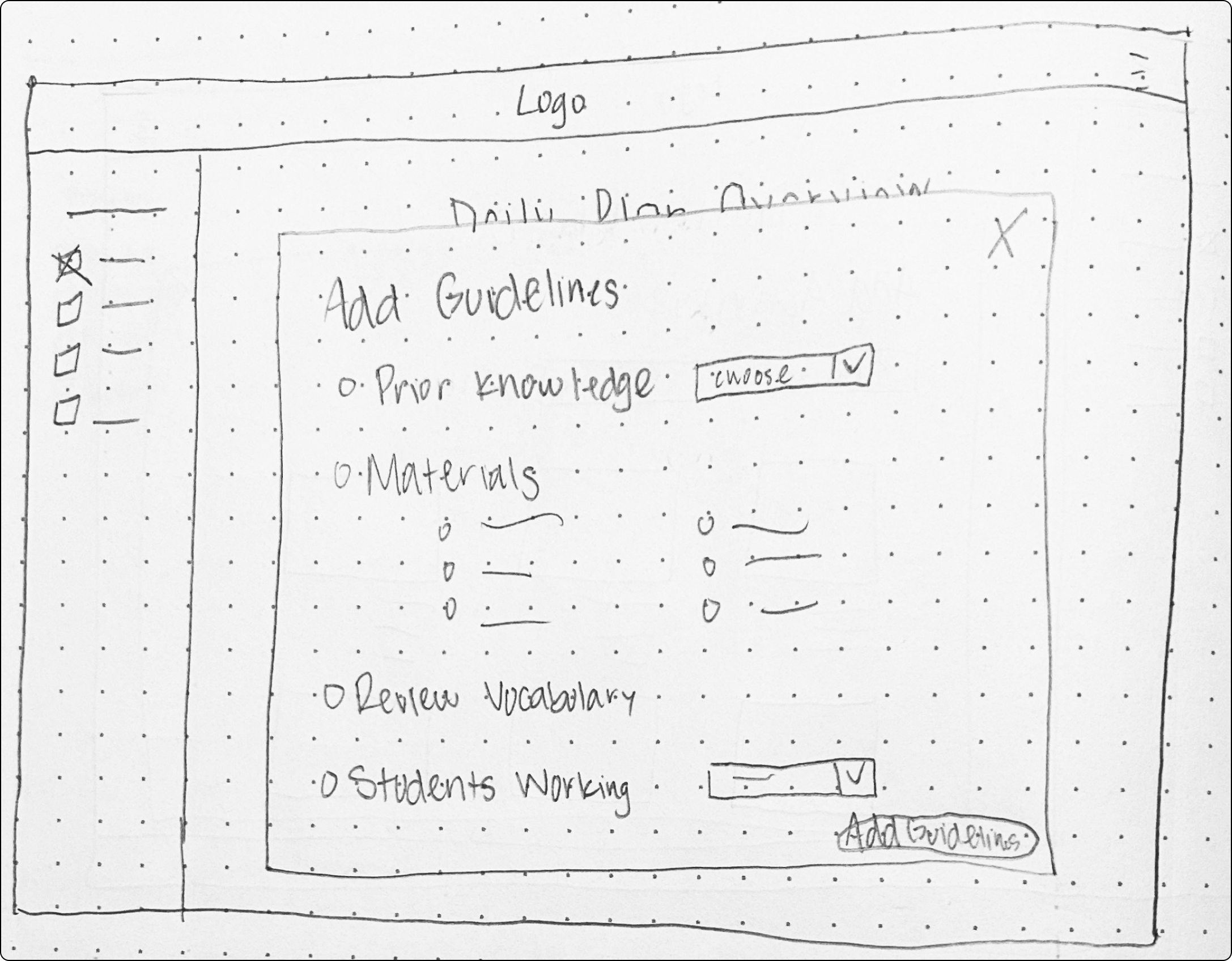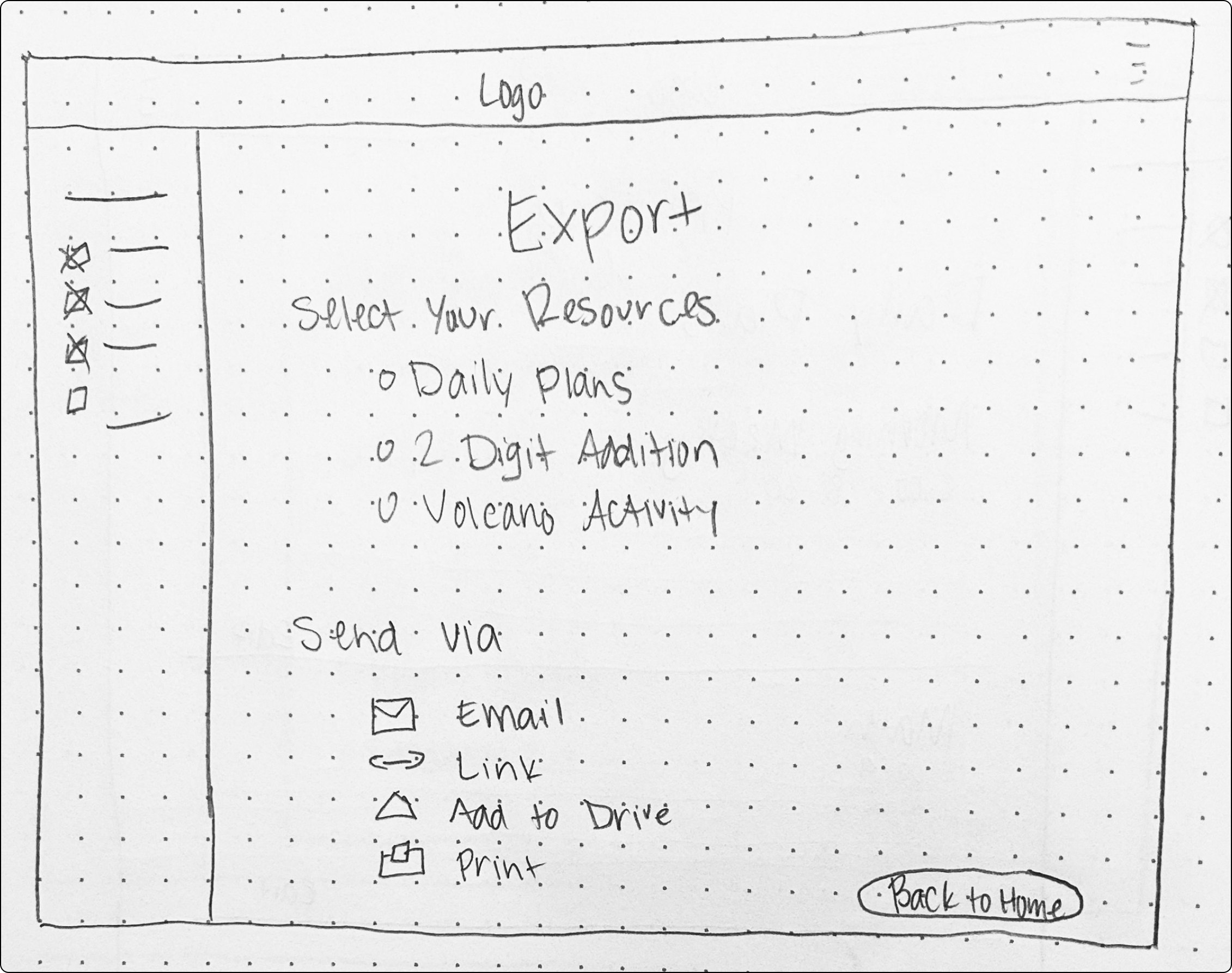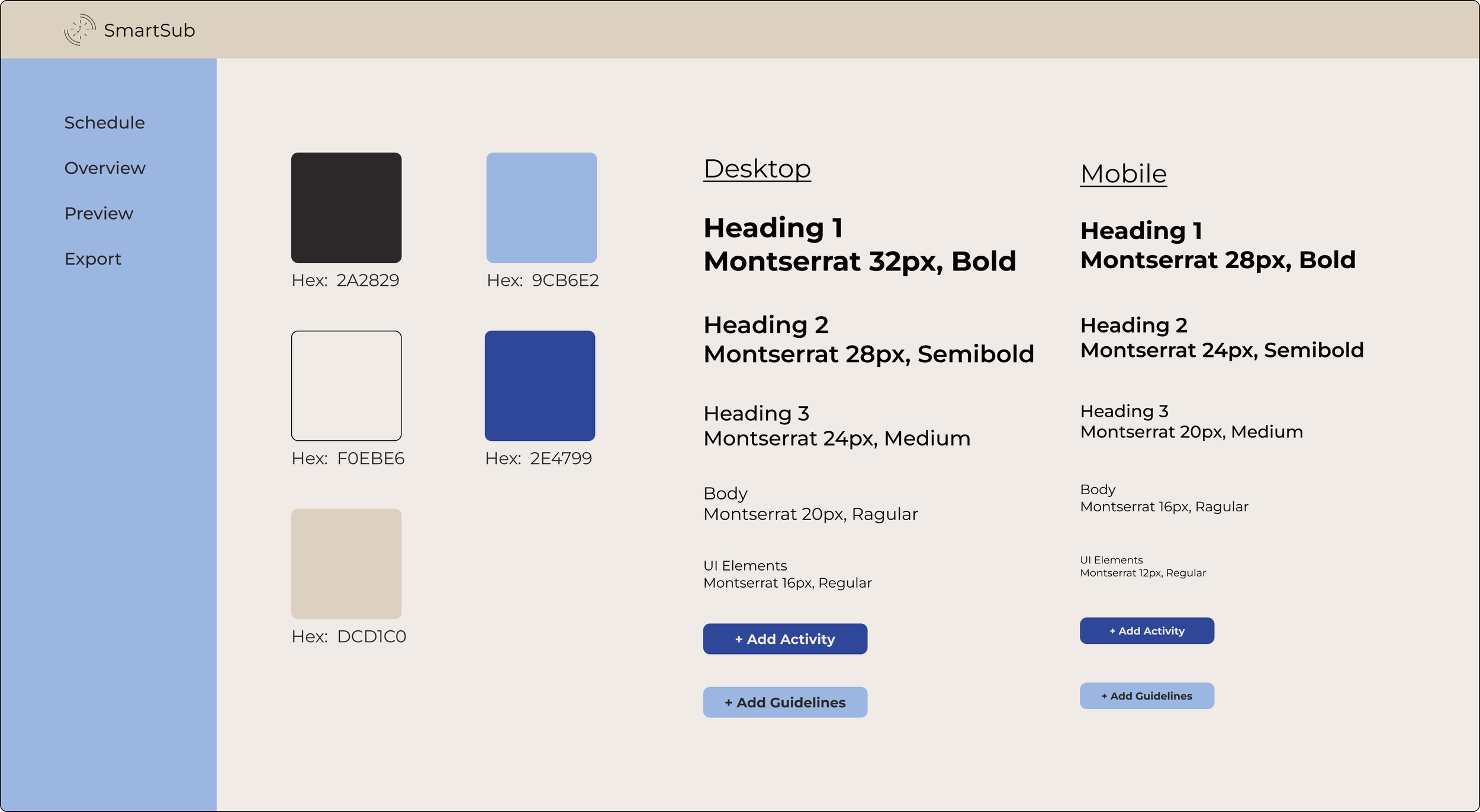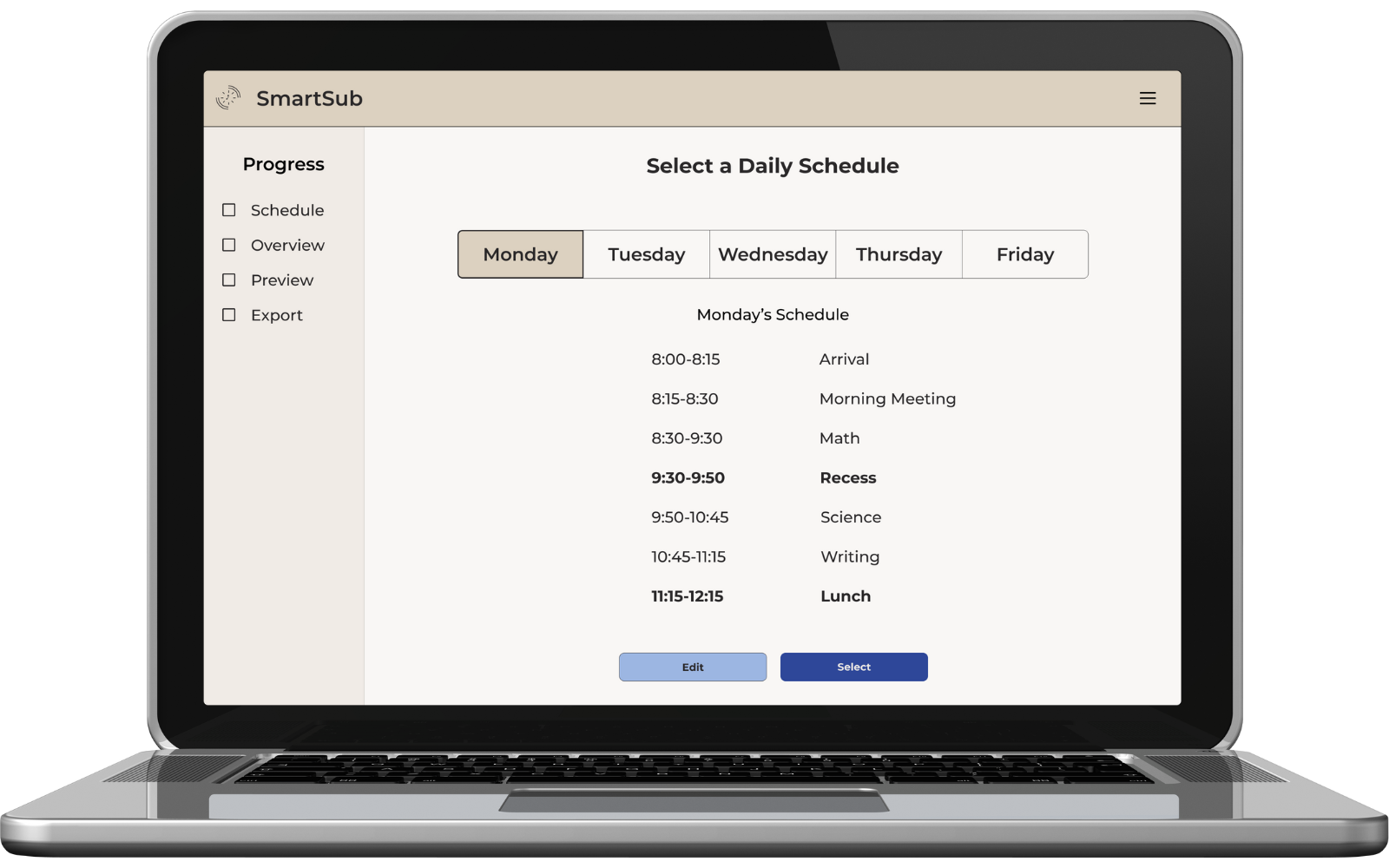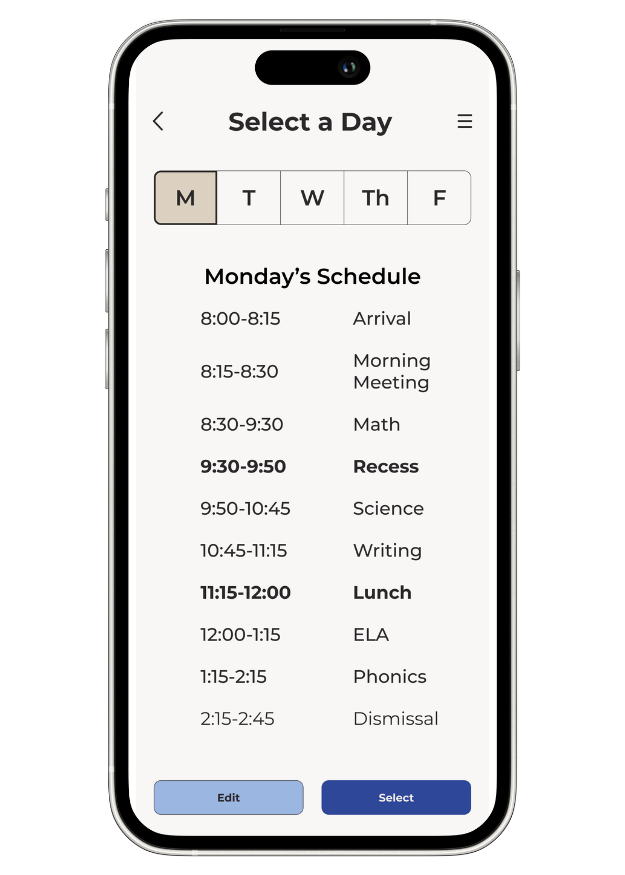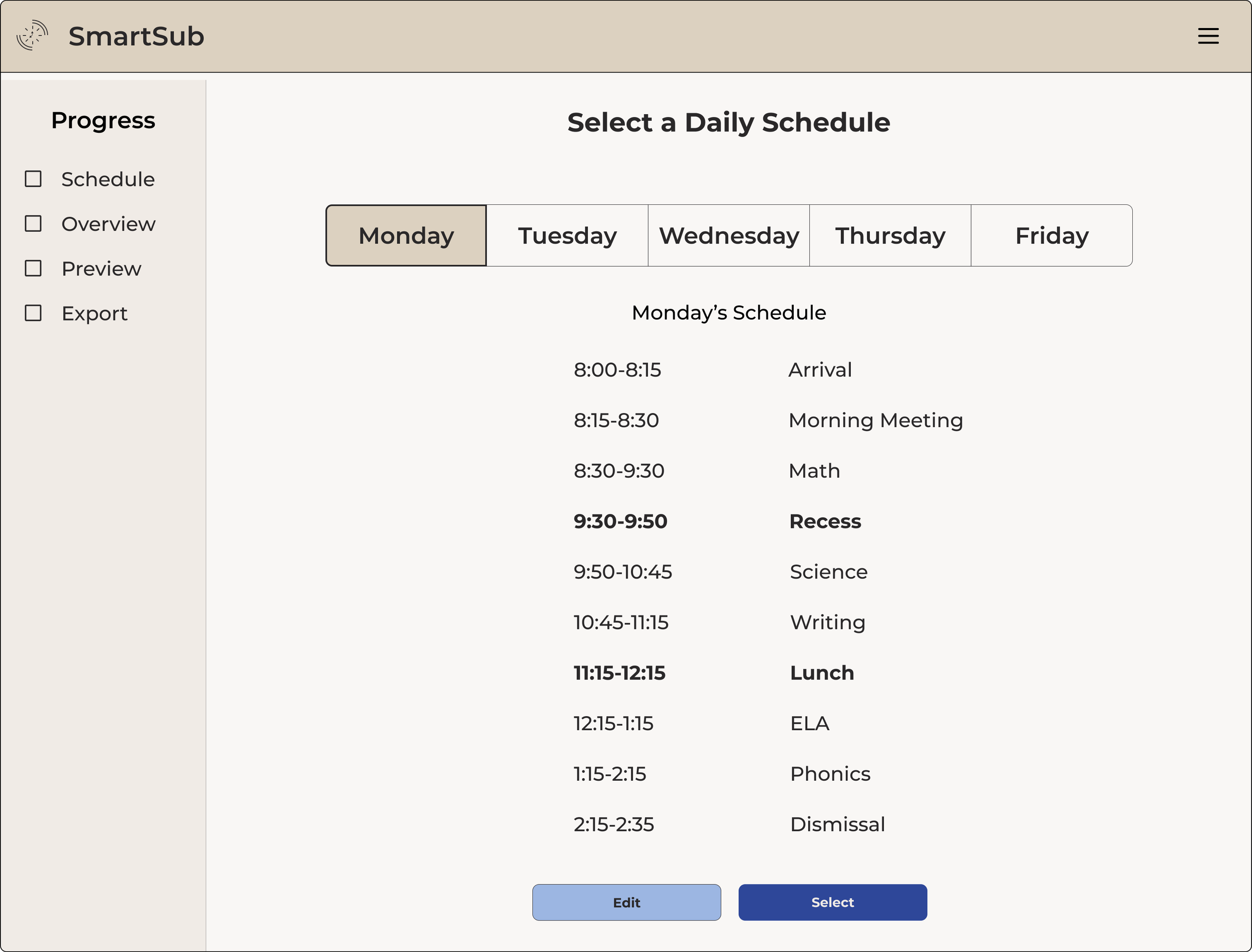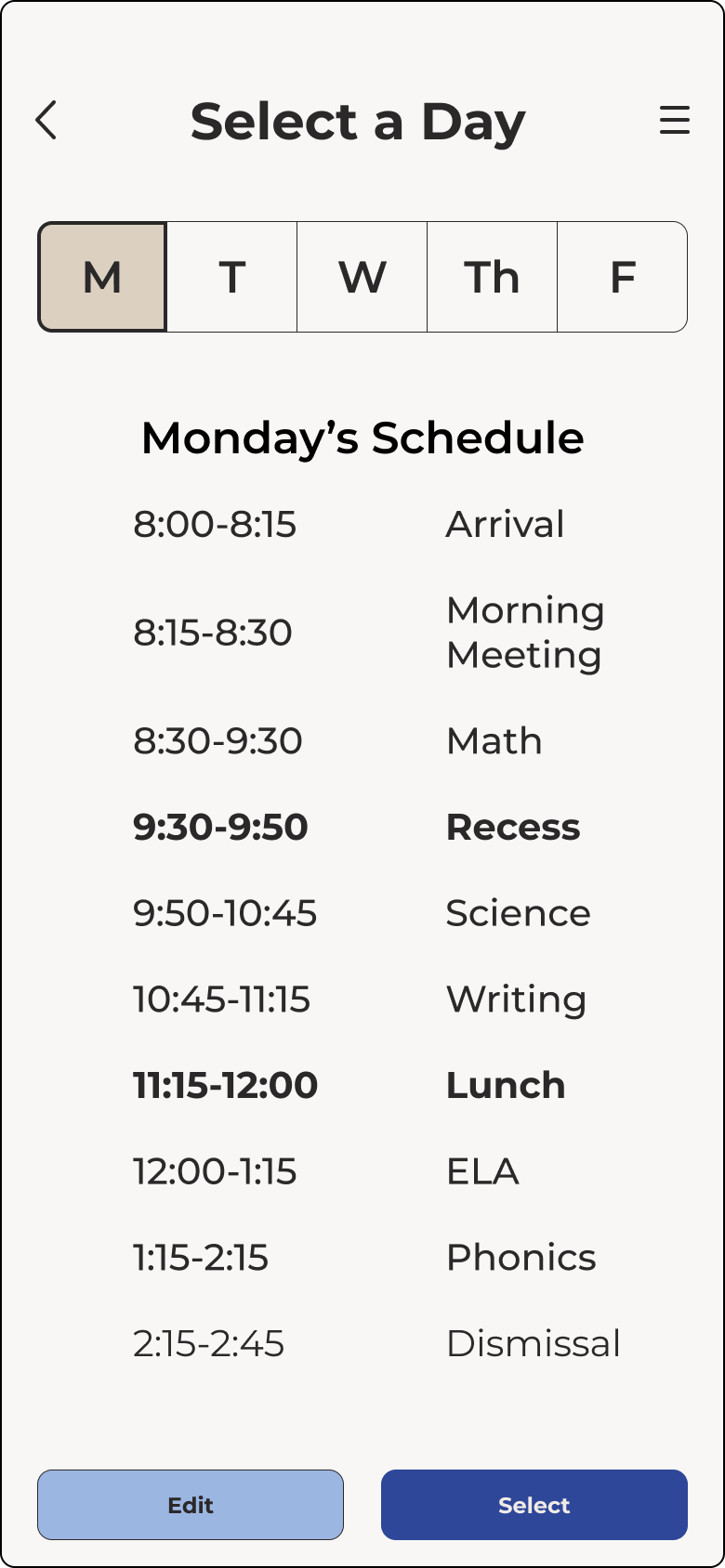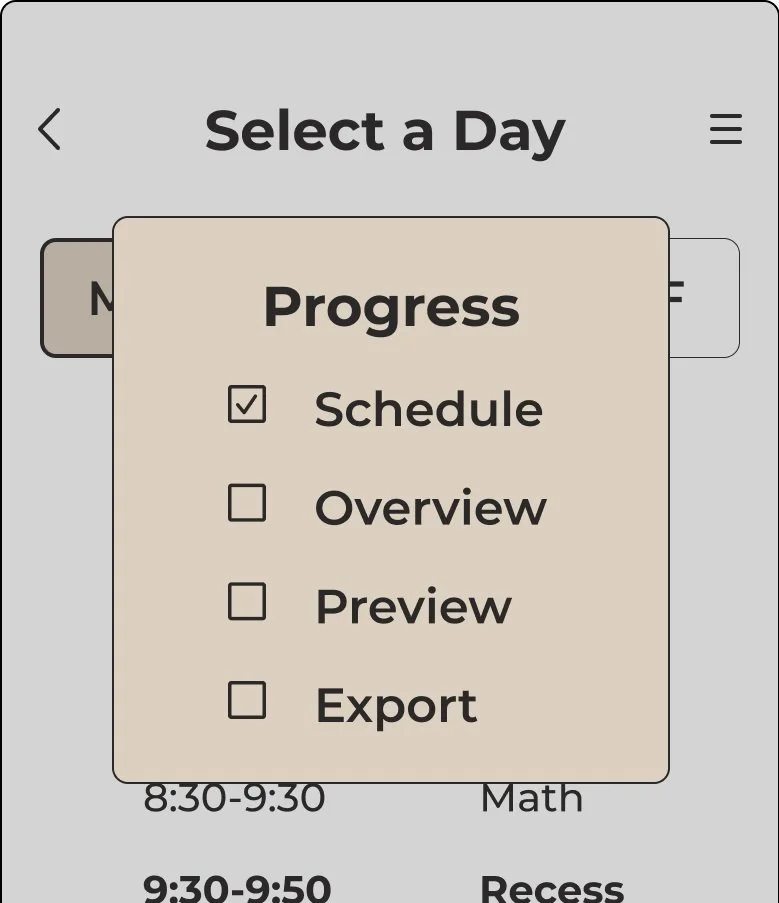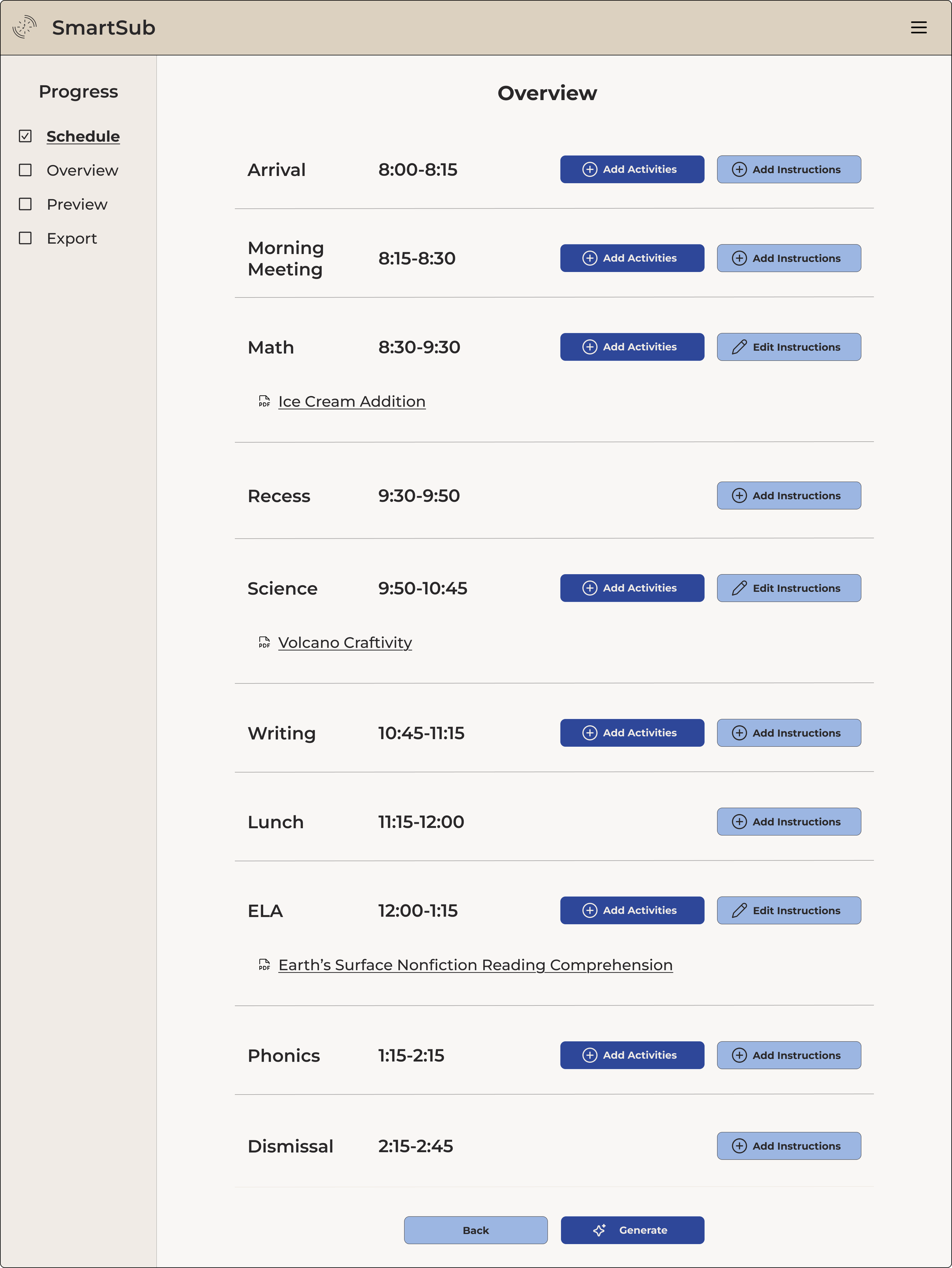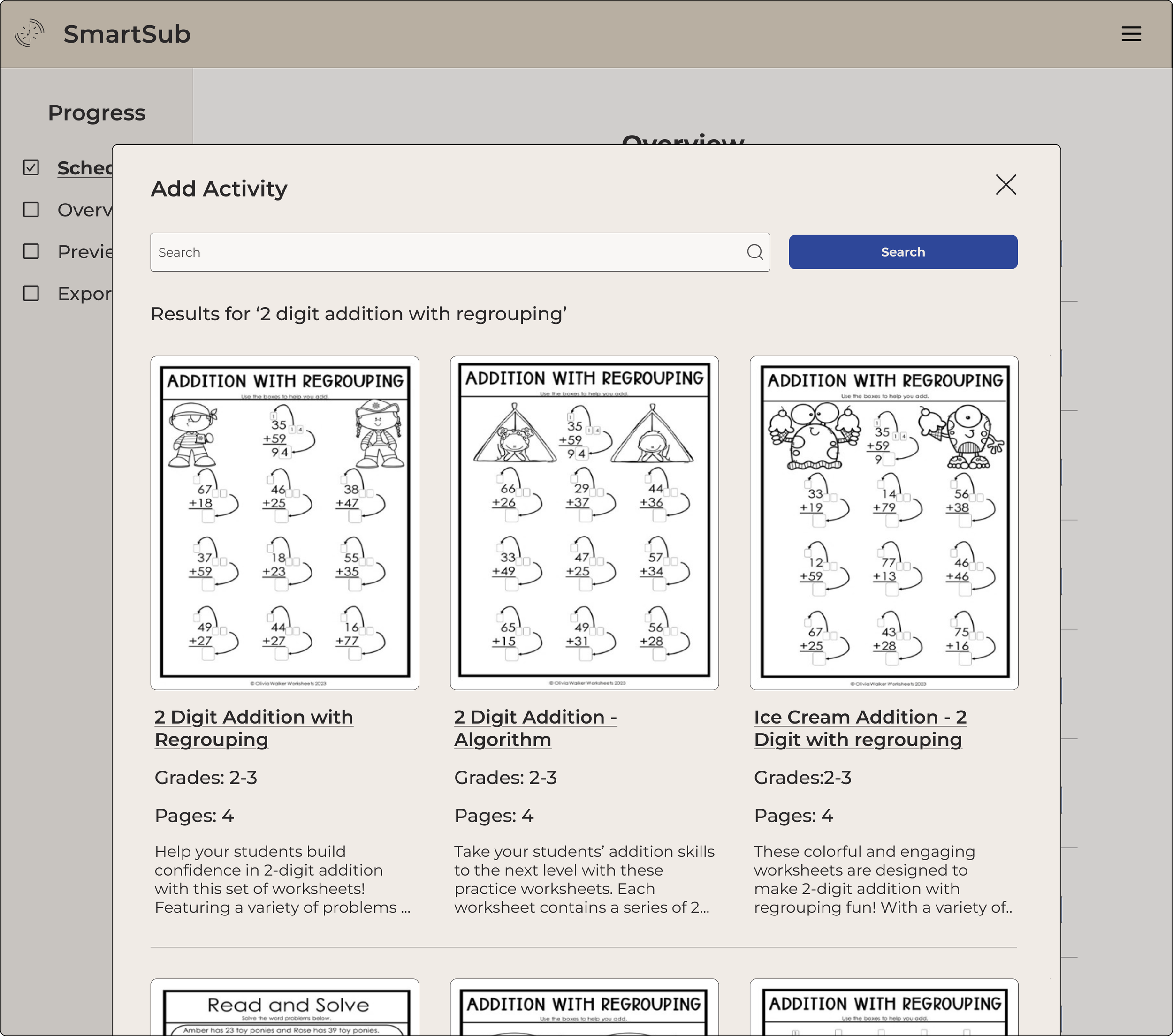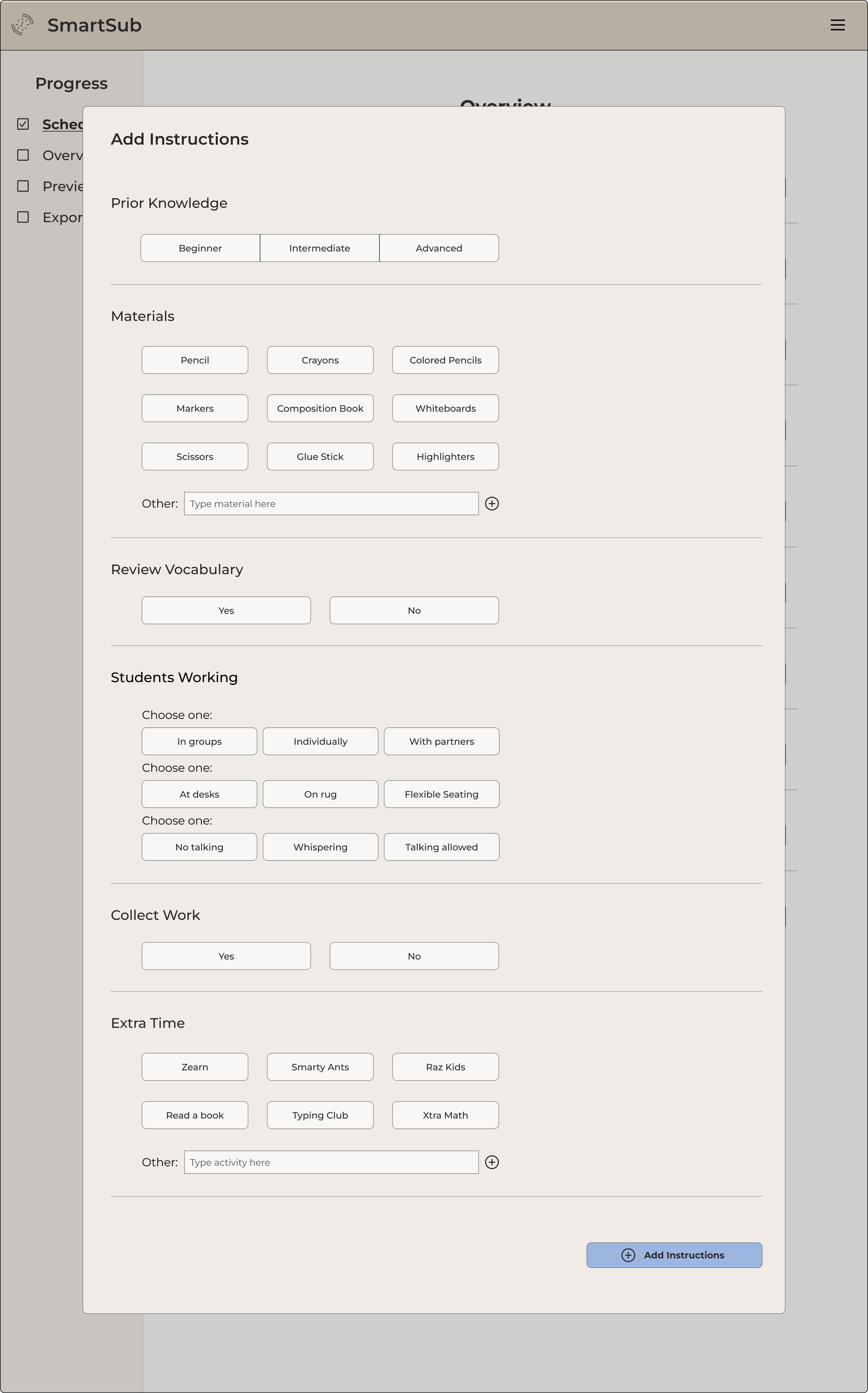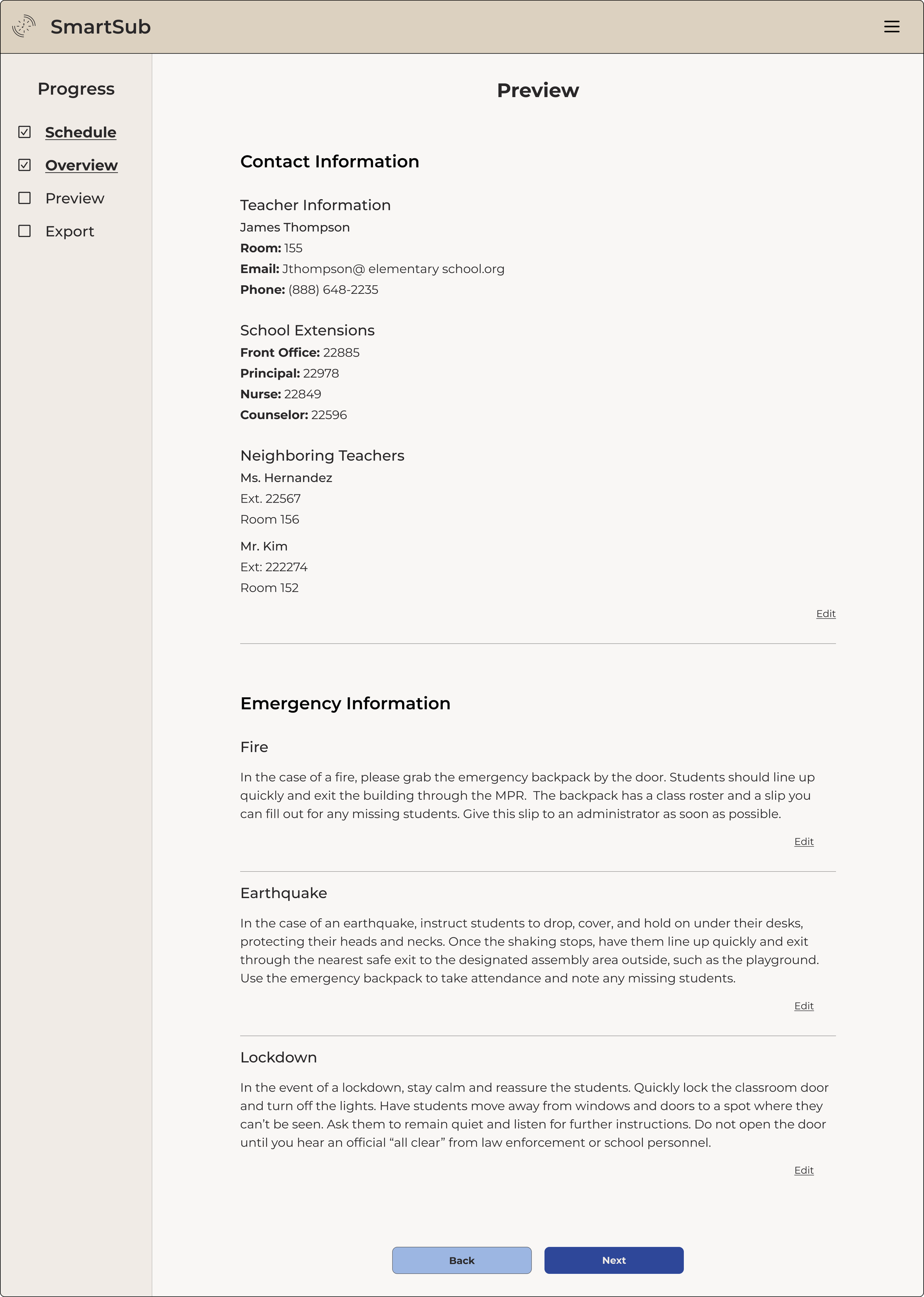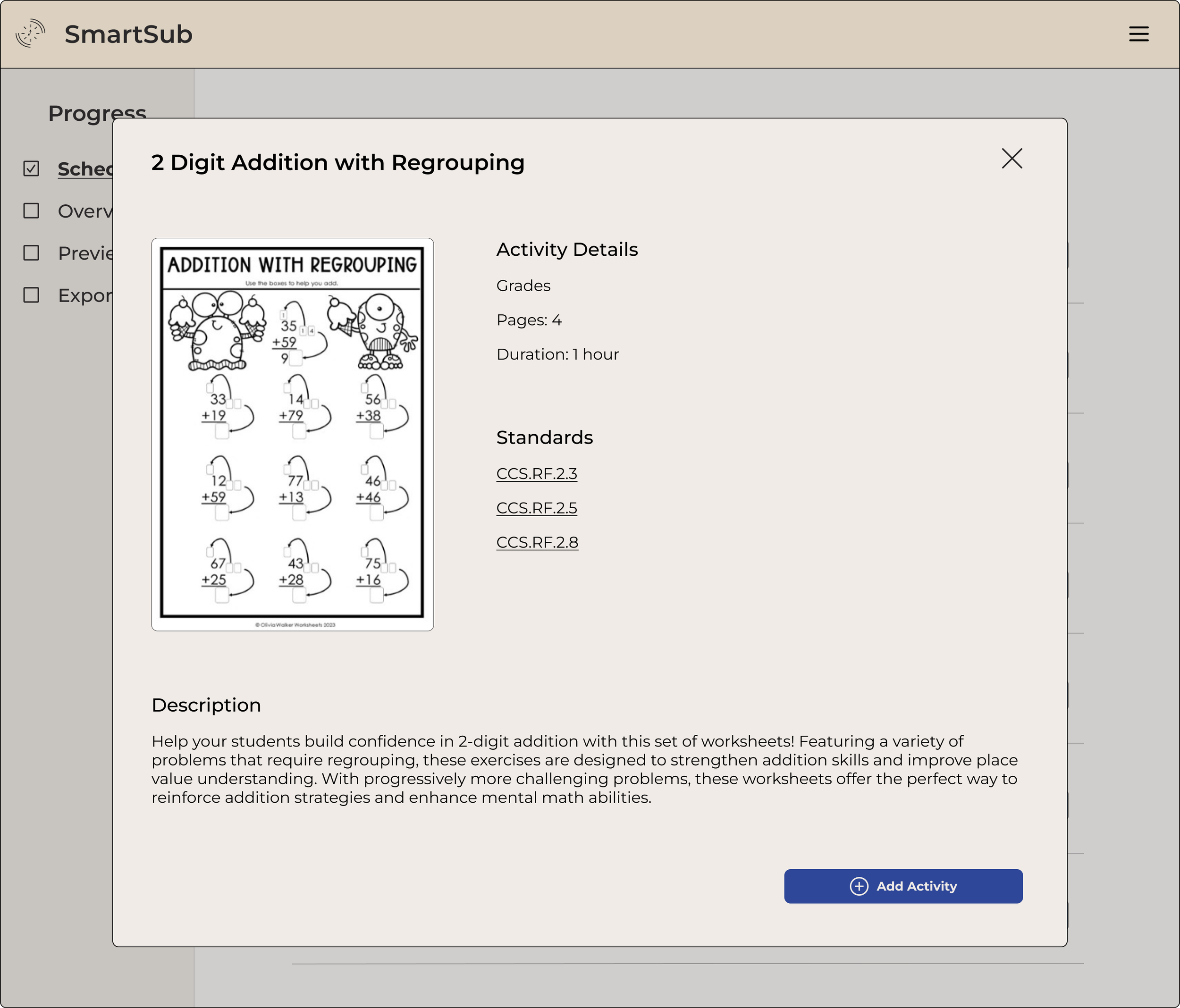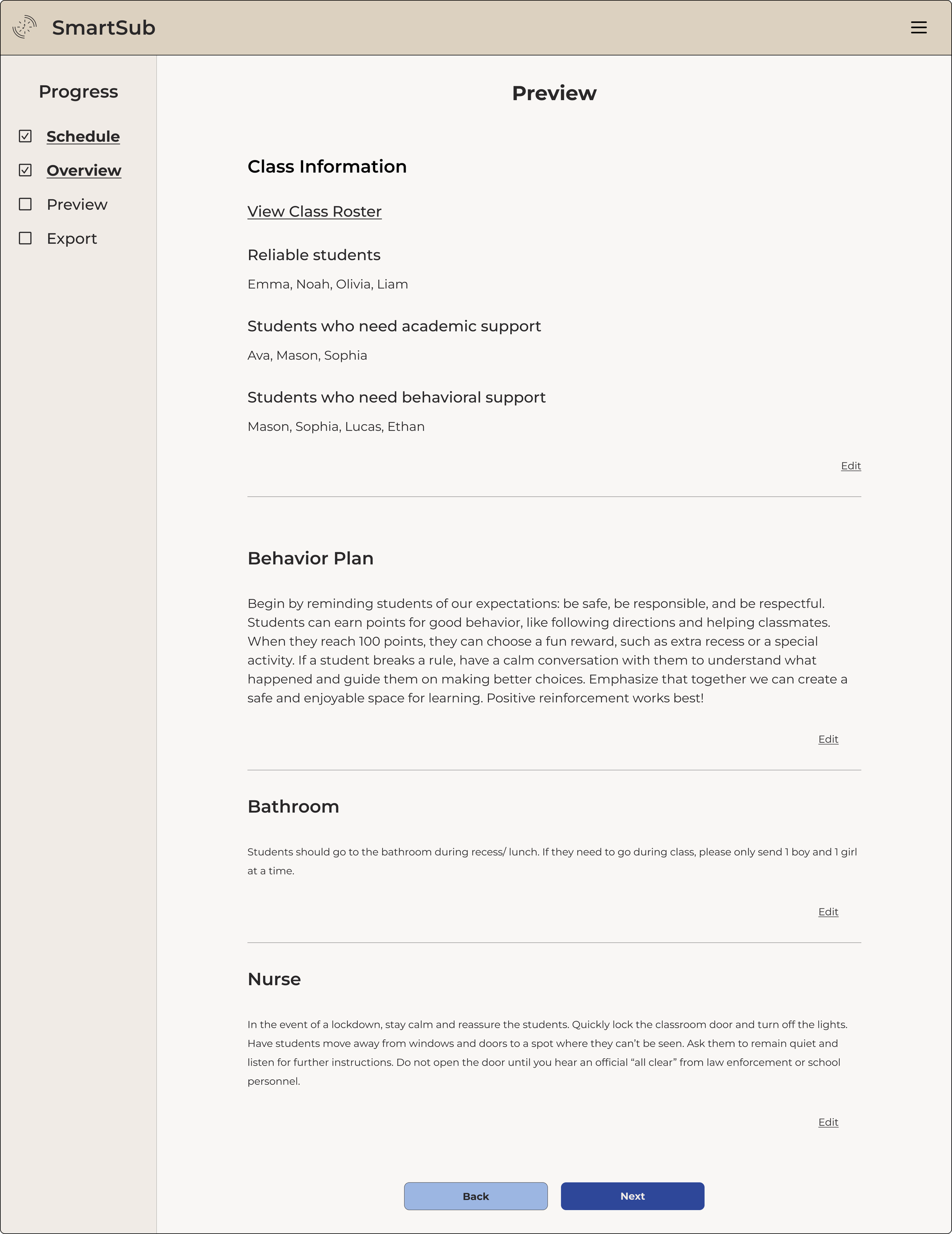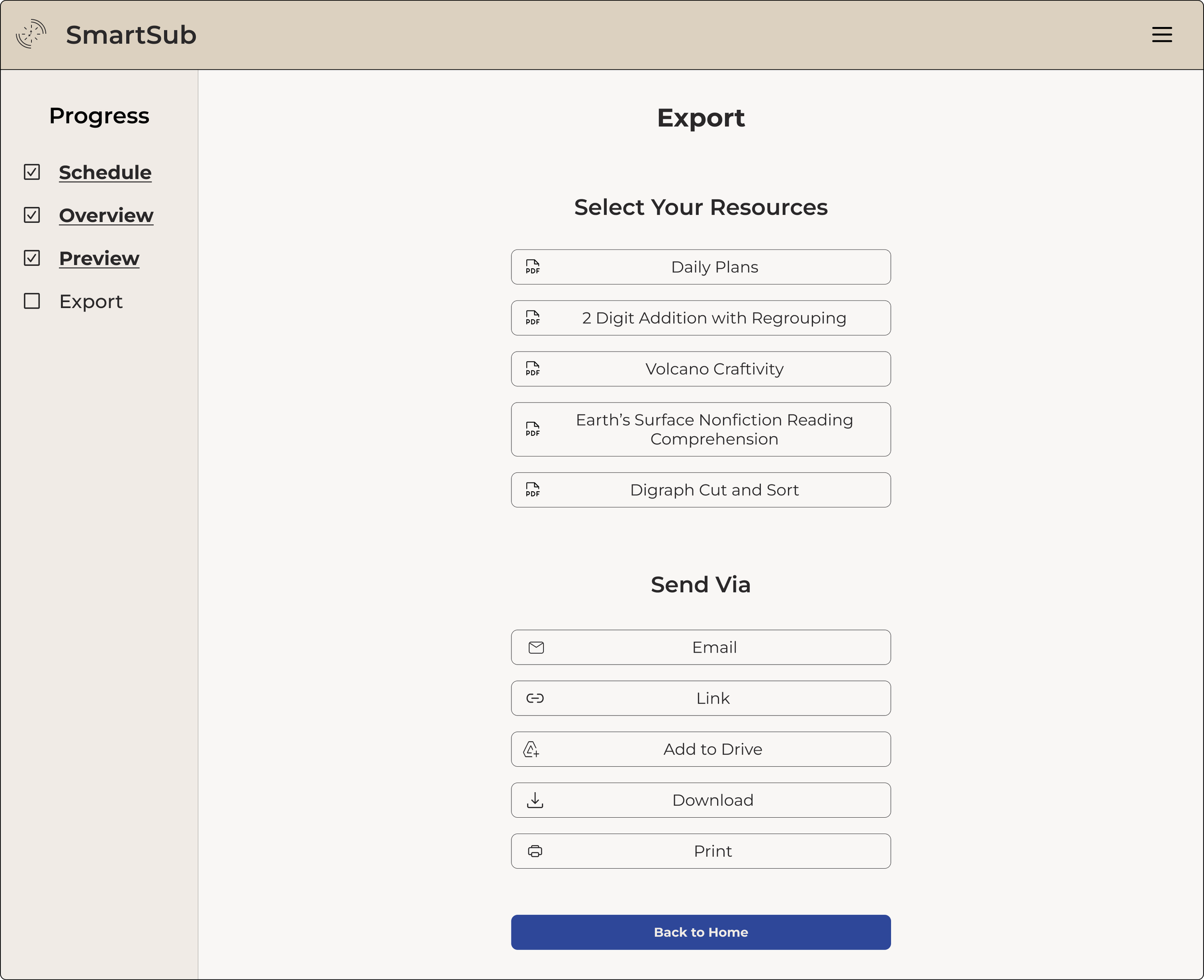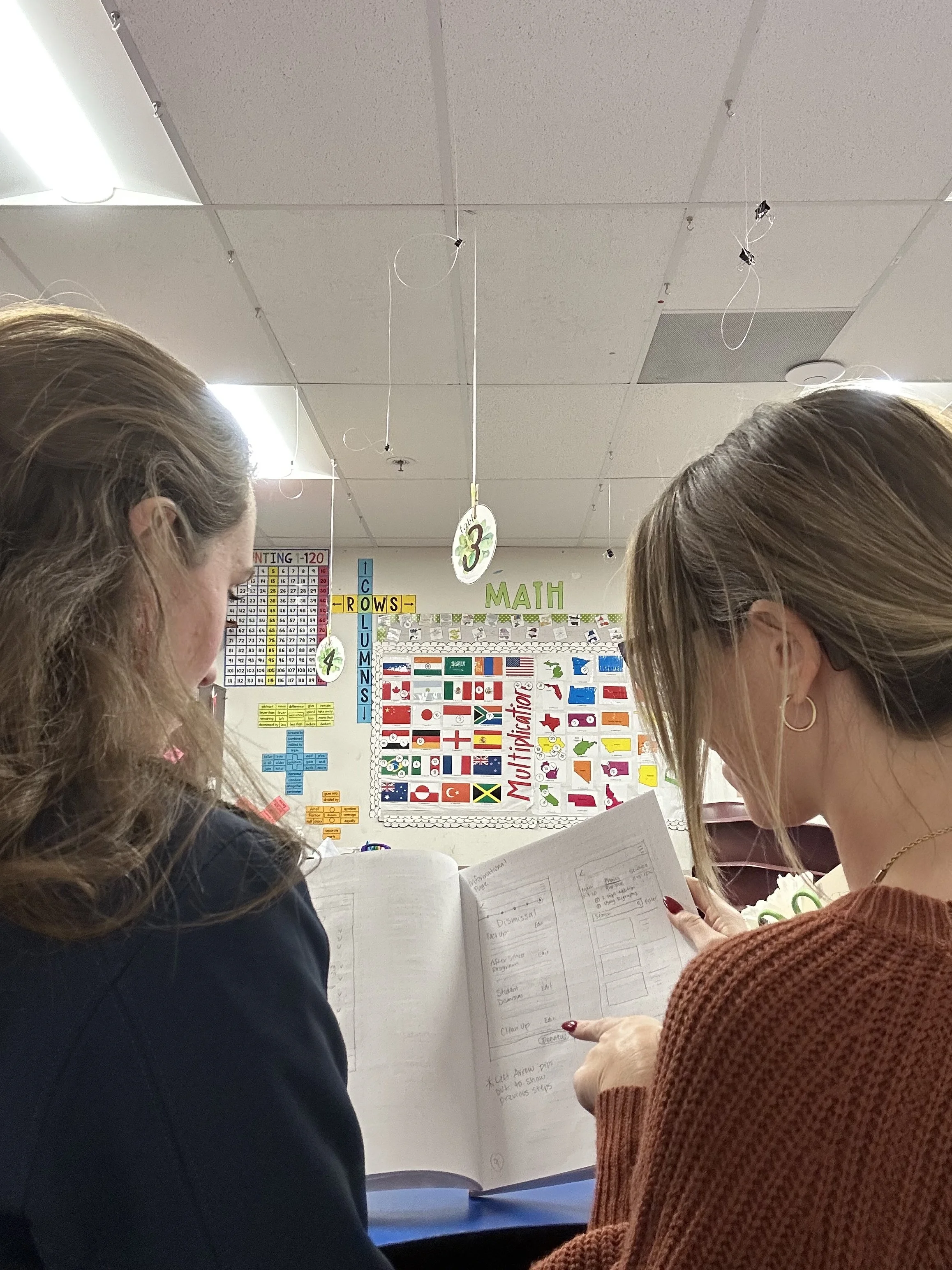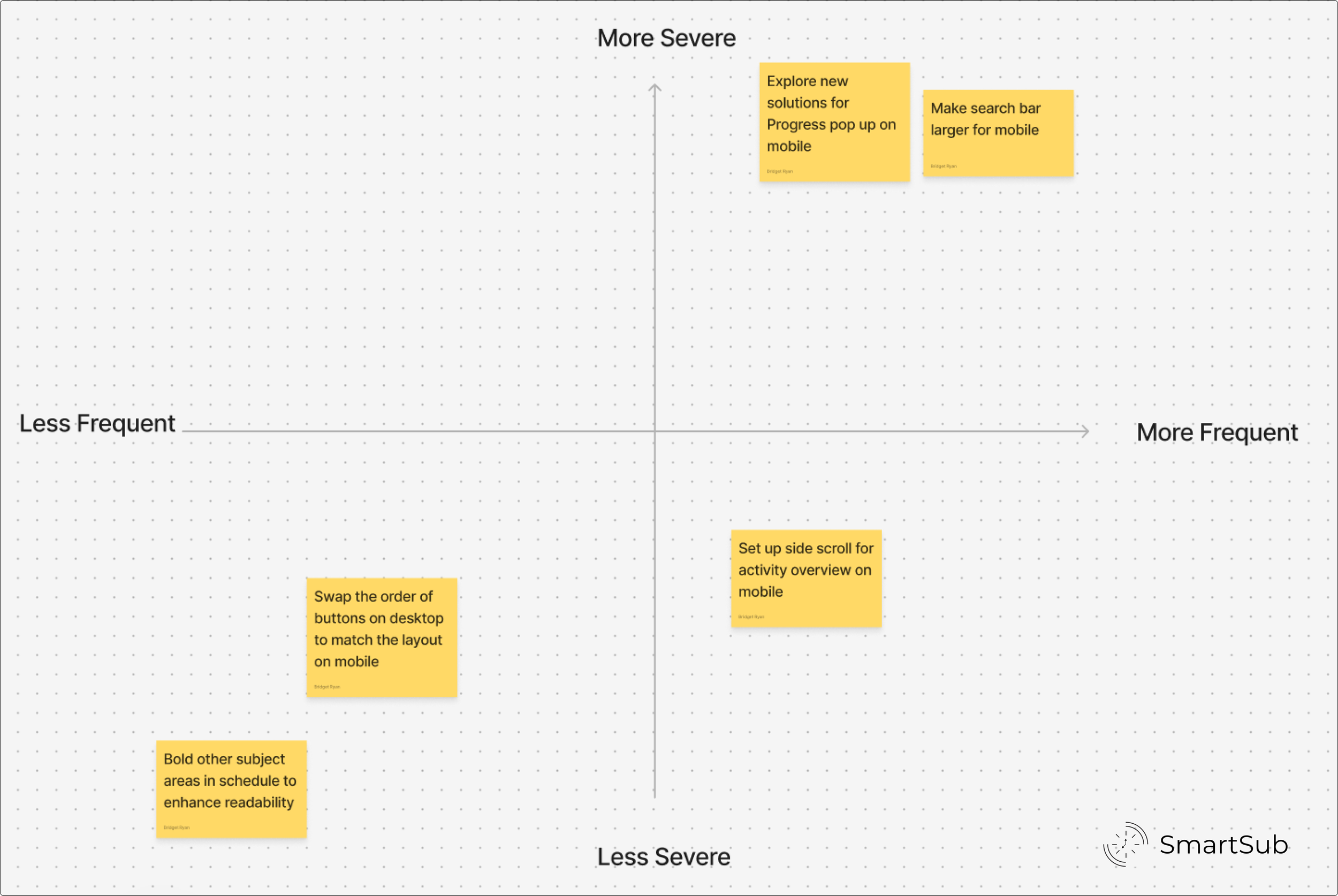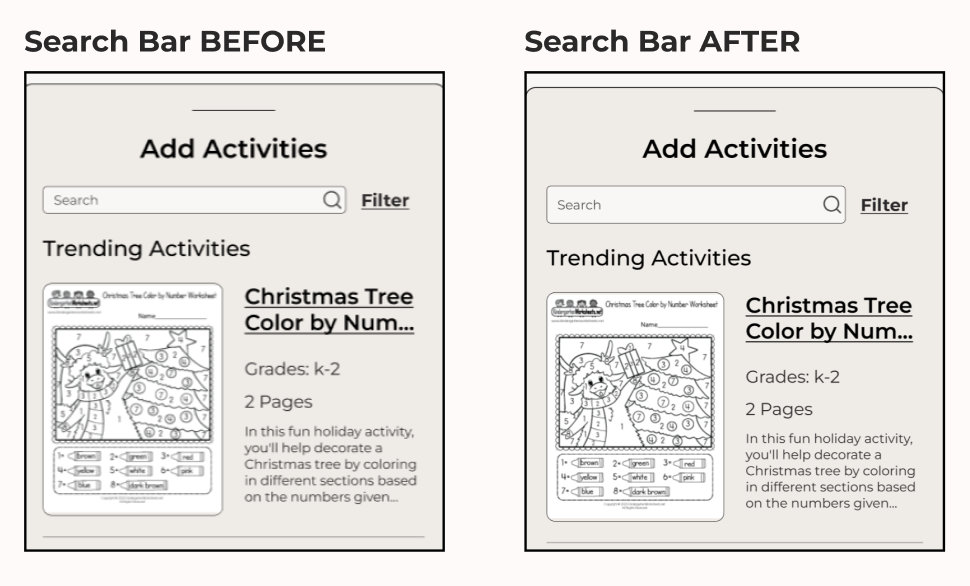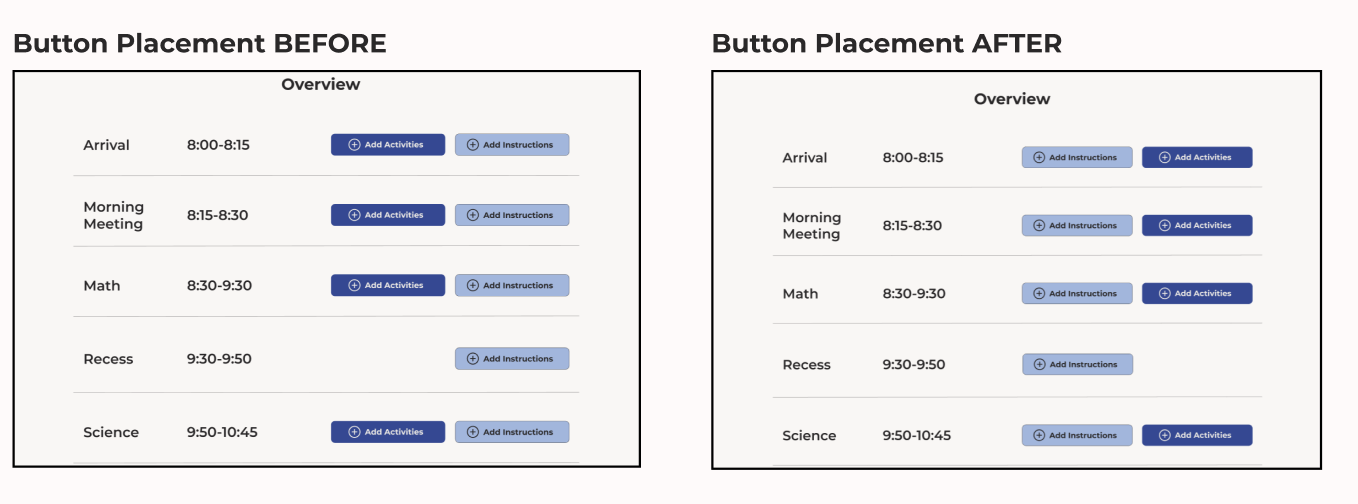Harnessing AI to simplify sub plans and support teacher well-being.
Timeline
80 hours
Roles
UX Researcher
UI Designer
Branding
Project
Responsive Website
Tools
Figma
Figjam
Deliverables
Competitive Analysis
User Interviews
Affinity Map
Persona
Product Roadmap
User Flow
Low Fidelity Wireframes
Moodboard
Style Tile
High Fidelity Wireframes
Usability Test Results
Priority Iterations
Reflection
Next Steps
Overview
SmartSub is an AI-powered platform designed to simplify the process of creating sub plans for teachers when they need a substitute to stand in for the day. Often, teachers choose to go to work instead of taking a much-needed day off because writing detailed sub plans is time-consuming and stressful. It’s not just about taking a break; it’s about empowering teachers to step away when they need to without the burden of micromanaging their day for someone else. SmartSub streamlines this process by offering customizable options that generate clear, descriptive plans, ready for immediate use. By reducing the time and effort spent on sub plans, SmartSub aims to give teachers the freedom to take well-deserved time off and return refreshed, knowing their students were well-supported in their absence.
Background
As an elementary school teacher, I struggled to take a day off due to the time-consuming task of writing detailed sub plans. The process—providing classroom details, schedules, and ensuring substitutes could keep students engaged—was overwhelming. I realized this was a common challenge for teachers, and I wanted to find a solution.
I turned to AI to simplify the process. My solution prompts teachers to input key details, like schedules and routines, which can be saved and reused. It also includes a library of review activities, aligned with current lessons, to help substitutes keep students engaged. AI generates clear, customizable instructions, saving teachers time and reducing stress. SmartSub makes it easier for teachers to take time off, ensuring a smooth day for both students and substitutes.
Researching the Sub Struggle
Competitive Analysis, User Research, Affinity Map, Persona
Research Goals
I set out to explore the following goals through my research:
What challenges keep teachers from using their PTO?
What are the biggest pain points for teachers when making sub plans?
What is the current process that teachers use to make sub plans?
What activities do teachers prefer or avoid assigning for students when they have a substitute?
Competitive Analysis
Competitive analysis revealed the following insights:
Magic school combines teachers input and AI to generate resources for teachers.
Over 50 tool options to choose from
Saves resources for later use
Outputs do not include images
No options for substitutes
Diffit generates instructional materials using teacher input and AI.
Available for language arts, math, and science
Available for grades 2-11
Same worksheet layouts provided for all activities, while content is specified by teacher input
Education.com provides ample instructional materials for teachers to choose from.
Options such as lesson plans, worksheets, games, and sub plan bundles
Does not offer personalization with the use of AI
Teachers Pay Teachers provides an online library of resources created by teachers
Wide variety of resources available
Does not offer personalization with the use of AI
Teachers must purchase items they wish to use
User Interviews
"I try to use a template, but with how often schedules change, it still feels like I’m starting from scratch every time.”
- Jessica J.
Topics:
What challenges keep teachers from using their PTO?
What are the biggest pain points for teachers when making sub plans?
What is the current process that teachers use to make sub plans?
What activities do teachers prefer or avoid assigning for students when they have a substitute?
“There is pressure when planning for a day off. You have to consider everything”
-Anna J.
Demographics: 5 users (all women)
Teachers who work with K-8 aged students
Ages 29-35
Method: In person interview
“Good sub plans are simple and don’t over complicate cause substitutes don’t always know how to teach”
-Ashley B.
Insights:
Many teachers find creating substitute plans so frustrating they avoid taking time off, even when sick or stressed.
The pressure to create detailed plans and ensure a smooth day for students and substitutes often deters teachers from taking time off.
Teachers prioritise including clear daily schedules, engaging review activities, and class/student information in their sub plans.
Teachers typically spend between 1 to 3 hours preparing substitute plans.
Affinity Mapping and Personas
Affinity mapping (see Affinity Map) and analysis of user interviews revealed these key insights into user needs and decision-making behaviors:
80% of teachers said that making sub plans is a barrier to taking the day off
80% of teachers said they it is hard to remember all the details of the day
100% of teachers want to use review activities that are engaging
80% of teachers mentioned using a template to cut down on planning time
80% provide important school/class information for their substitutes
Using this data, this unique user persona was created. (see Persona)
Disgruntled Ms. Day: Sarah is a dedicated teacher who finds writing sub plans time-consuming and stressful, often spending hours to ensure clear instructions, updated schedules, and engaging activities. Balancing pressure from her boss and the challenge of remembering daily routines, she wishes for an easier way to ensure her students and substitutes have a smooth, successful day.
Brainstorm in Process
Ideation, Product Roadmap, User Flow
Refining the Project Focus
Based on insights from my persona, it was clear that teachers need a way to simplify the process of creating sub plans to feel more comfortable taking time off. Teachers face challenges like constantly changing schedules, finding activities that align with current lessons, and providing detailed instructions for substitutes. Keeping these priorities in mind, I started exploring potential solutions to address their needs.
Problem Statement: I’d like to explore ways to help K-8 teachers find review resources that align with their current classroom topics so they can create a seamless day for substitutes and students.
HMW: How might we provide teachers with review resources that align with their current classroom topics?
Problem Statement: I’d like to explore ways to help K-8 teachers produce clearly outlined daily instructions for substitutes so that they can reduce their cognitive load when creating sub plans.
HMW: How might we produce clearly outlined daily instructions for teachers to give to their substitutes?
Product Roadmap
As I began developing a solution, I focused on outlining the various features my product would need to include. To ensure a clear direction and prioritize the most essential elements, I organized these features into four distinct categories. This structured approach allowed me to identify which features would deliver the greatest value and address the core needs of the target audience.
(High Priority)
Must Haves
Logging in
Student information
Students with academic, health, or behavioral needs
Daily schedule selection
Class routines
Activity library
Sub plans generator
AI generated instructions of subs
Edit sub plans option
Nice to Have
Saved sub plans
End of the day note from sub
Consumables links to print or export
Surprising and Delightful
Theme options for sub plans
Slides generator
Substitute reflection for students
Student feedback on how the day went
(Low Priority)
Can come later
Teacher connections/share
Option to follow other teachers and use the same plans with their current class info
User Flows
A user flow was created to address the persona's identified needs, ensuring an efficient and seamless journey for teachers. Key steps in the flow include:
1. Selecting a Schedule: Teachers choose the schedule that fits the day they are taking off.
2. Choosing Activities: Teachers browse a library to find activities for their class.
3. Specifying Detailed Instructions: Teachers can customize instructions to ensure clarity for substitutes.
4. AI-Generated Plans: The process concludes with AI compiling the selected inputs into comprehensive sub plans for review and export.
User Flow: Generate Sub Plans (See User Flow)
Shaping User Ineractions
Low Fidelity Sketches
Wireframe Sketches
Select Your Schedule Screens
1. Option to select which day of the week the plans will be for
2. Option to edit schedule if needed
Desktop
Mobile
Daily Plans Overview Screens
1. Subjects and times separated into sections for visibility
2. Option to add activities and guidelines for each part of the day
3. Activities appear once selected
4. Progress bar displays where you are in the process
Mobile
Desktop
Activity Library Screens
Overlay/ bottom sheet keeps the steps clear for users
Search option gives users control over types of activities
Filter option makes search more efficient
Activity thumbnail and description supports rapid browsing
Desktop
Mobile
Activity Preview Screens
Option to see whole page worksheet
Activity description helps teachers decide if this is a good for for their class
‘Add Activity’ button adds activity to Overview screen
Mobile
Desktop
Add Guidelines Screens
Prompts help relieve cognitive load for teachers to consider everything needed for a lesson
Lots of options provided to help generate more/less specific lesson plans
Desktop
Mobile
Preview Information Screens
Organized into categories to keep the experience manageable
Option to edit each section independently
Desktop
Mobile
Preview Daily Plans Screens
Activities and guidelines combined using AI to generate instructions for each part of the day.
Option to edit instructions if needed
Option to go back and make changes in overview
Desktop
Mobile
Export Plans Screens
Ability to export resources in variety of ways
Ability to export different resources in different ways (ex: email Daily Plans, print 2 Digit Addition)
Mobile
Desktop
Phase 4: Design and Branding
Process: Moodboard, Style Tile, High Fidelity Wireframes
Branding
The design reflects SmartSub's core values and mission to simplify sub planning for teachers. Key design choices include:
Color Palette: Blues and tan/browns convey professionalism and trustworthiness.
Logo Design: A clean sans-serif font paired with a clock icon featuring missing sections, symbolizing preparation for time away.
Name Significance: The inclusion of "smart" highlights the platform's use of AI to streamline and ease the planning process for teachers.
Brand Values
Streamlined
Customizable
Innovative
Intuitive
Time-saving
Moodboard
Color Palette and Fonts
High Fidelity Wireframes
Select a Schedule
Bolded portions of the day when teacher gets a break
Left aligned text for readibility
Option to edit if schedule has changed
Desktop
Mobile
Progress Overlay (Mobile Only)
Appears for 1.4 seconds to quickly signal to user their current progress after each step is completed
Darker background to bring hierarchy to the overlay
Overview
Daily activities separated for visual clarity
‘Add Activities’ button as primary CTA because teachers will likely want to add activities before instructions
Activities with pdf icon appear once a selection has been made
Generate button features an AI icon to let users know that the plans will be created using AI
Desktop
Mobile
Activity Library
Overlay/bottom sheet helps users easily follow the steps.
Search function allows users to specify the types of activities they want.
Filters streamline the search process for quicker results.
Activity thumbnails and descriptions enable users to browse efficiently.
Desktop
Mobile
Activity Preview
Option to side scroll to see more images on mobile
Information is arranged in order of priority, ensuring the most important details are presented first for the user
Desktop
Mobile
Add Instructions
Adjusted the layout from initial sketches to include a more visual selection method, removing the need for dropdown menus to view all options
Opted to use the language ‘instructions’ as opposed to ‘guidelines’ for this section
Mobile
Desktop
Preview Contact and Emergency Information
Divided these information sections into two pages to create a more intuitive and user-friendly grouping of content
Used larger title font sizes to create visual hierarchy for each section
Included the ability for users to edit specific sections as needed
Mobile
Desktop
Preview Class Information
Option to 'View Class Roster' as a separate action to maintain a clean and uncluttered interface.
Information is organized by priority, presenting the most important details to the user upfront
Included the ability for users to edit specific sections as needed
Desktop
Mobile
Daily Plans Preview
Parts of the day grouped togehter for visual clarity
Included the ability for users to edit specific sections as needed
Activities included utilize a pdf icon and the ability to click to see the activity
Desktop
Mobile
Export Resources
Provided the flexibility to mix and match resources and select the desired export format
Offered multiple export options to accommodate the diverse needs of teachers
Mobile
Desktop
Giving the Plan a Trial
Usability Test Plan, Priority Iterations, Reflection, Next Steps
Usability Testing
To make sure usability testing reflected my user persona, I chose participants with similar characteristics, needs, and challenges. This helped me gain valuable insights into the specific pain points and expectations of teachers. By focusing on the persona’s perspective, I could apply the test findings to create solutions tailored to their needs.
Demographic
5 participants (all women)
Teachers who work with K-8 aged students
Ages 29-35
Tasks:
Generate and export sub plans on mobile
Generate and export sub plans on desktop
Qualitative Goals
Determine whether users can successfully add an activity.
Assess if users are able to add instructions without difficulty.
Evaluate whether users can generate sub plans effectively.
Gauge user satisfaction with the experience of generating sub plans.
Quantitive Goals
Determine the rate of completion for each task, determine rate of user errors.
Test Results
Task 1: Generate and export sub plans on mobile
Successes on Mobile
100% of users thought the Select your Schedule screen was easily readable.
60% of users thought it was very easy to add instructions.
100% of users thought the Daily Plans Overview was easily readable.
Successes on Desktop
80% of users thought the Select your Schedule screen was easily readable.
80% of users thought it was easy to add an activity.
80% of users thought it was easy to add instructions.
Opportunities on Mobile
100% of users wanted to side scroll when looking over the individual activity.
60% of users had trouble clicking into the search bar to conduct a search.
100% of users said the Progress bar pop up was too fast.
60% of users used negative words when talking about the Progress pop up.
40% of users thought a few other subjects in the Schedule should be bolded (arrival, dismissal).
“The instructions section was great because it made it so much easier to figure out what I’d need for each lesson.”
-Anna J.
Task 2: Generate and export sub plans on desktop
Opportunities on Desktop
40% of users had questions about what 1 or more of the categories meant when adding instructions
40% of users moved the curser to ‘Add Instructions’ when told to click ‘Add Activity’ because the desktop layout did not match the mobile
Priority Iterations
I utilized a severity-to-frequency chart to assess and prioritize the value of my insights for the company. This approach allowed me to evaluate each point individually and accurately position it on the chart. Upon completing this process, it became clear that the key areas requiring iteration were as follows:
Make search bar larger
Ensure that users can use the search bar easily without needing to click multiple times.
Explore new solutions for the progress bar pop up
Since many users expressed negative feelings when talking about the pop up, new solutions will be explored.
Bold other subject areas in schedule
Improve the readability of the schedule by adjusting font size to make it easier for users to quickly scan each subject.
Order of ‘Add _____’ buttons do not match on mobile and desktop
Maintain consistency between screen types.
Iterations before and after
User Feedback: 60% of users experienced difficulty clicking the search bar.
Search Bar: Increased the size of the search container and touch target.
Efficiency: This adjustment improves accessibility and makes searching easier and more efficient for users.
User Feedback: 100% of users found the schedule easily readable.
Additional Insight: 40% of users suggested bolding the start and end of the day to minimize focus on less detailed sections.
Cognitive Load Reduction: This change helps ease the cognitive load for teachers when planning the day.
User Feedback: 100% of users felt the pop-up was too quick, and 60% expressed dissatisfaction with this type of pop-up.
Exploring Solutions:
Solution #1: Add a horizontal progress bar displaying the name of each step.
Solution #2: Highlight the current step while keeping the top section clean.
User Behavior Insight: 40% of users moved the cursor to ‘Add Instructions’ when prompted to click ‘Add Activity.’
Button Swap: The buttons were swapped to align with the mobile experience.
Consistency: This change creates consistency across different screen types.
Support User Confidence: The update helps build user confidence when completing tasks.
Next steps
Additional Testing: Begin testing the iterations that have already been made.
Next priority Task Flow: Begin planning for the customizable school and class information that teachers can preset to efficiently generate their plans.
Reflection
This project helped me improve my design skills, explore AI, and address user challenges effectively.
Growth as a Designer:
Improved use of auto layout for efficiency
Gained confidence in integrating AI to create practical solutions
Challenges and Solutions:
Used overlays and bottom sheets for clear user navigation
Simplified design by focusing on readability, avoiding unnecessary icons
Key Takeaways:
Enhanced workflow and design tool skills
Gained insight into AI’s potential for future projects


